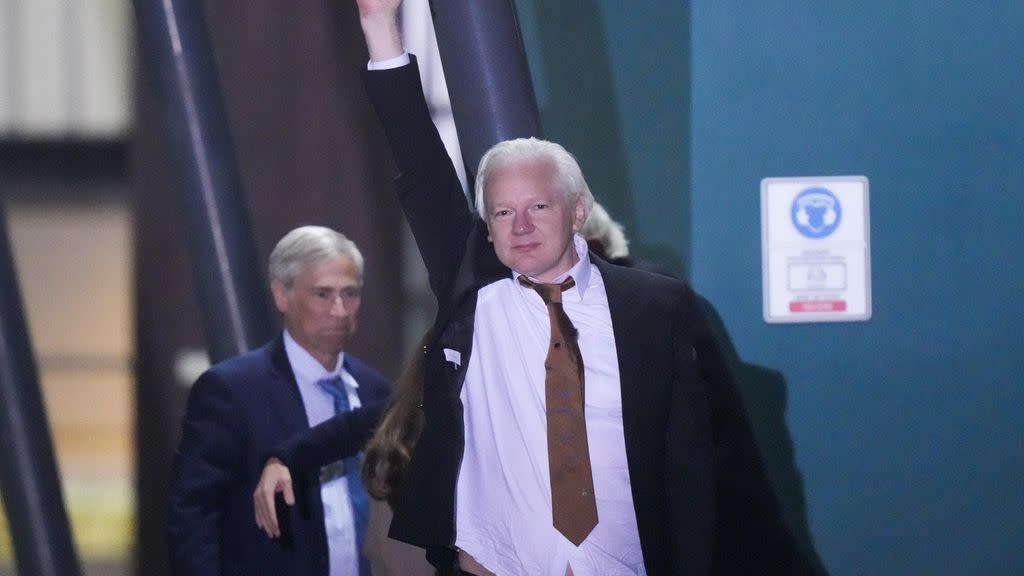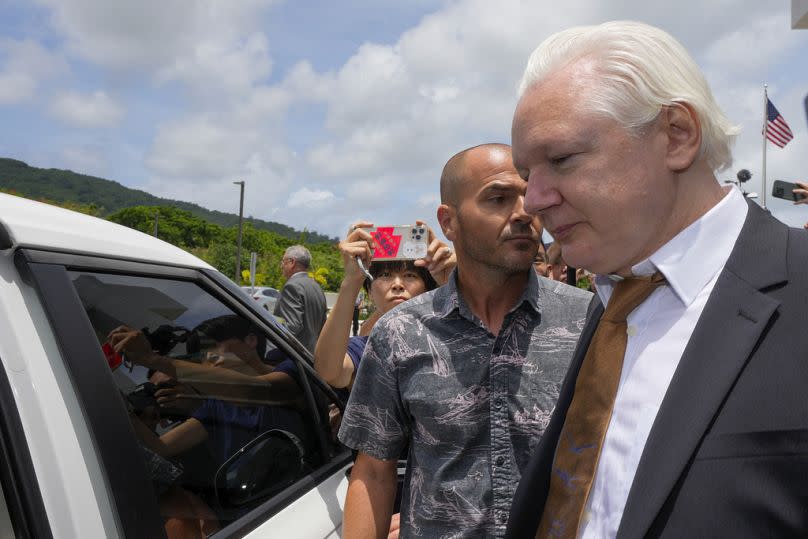Julian Assange walks free after pleading guilty in US court to leaking military secrets

A plane carrying WikiLeaks founder Julian Assange landed in the Australian capital Canberra on Wednesday night, with his arrival met by cheers from supporters.
Footage from the landing shows the press freedom advocate exiting the plane to embrace and kiss his wife, Stella Assange, on the tarmac of the Canberra Airport terminal.
Assange, a free man for the first time in 12 years, could be seen victoriously thrusting his fist into the air before disappearing inside the terminal.
At a press conference inside, Stella said that her husband wanted her to "sincerely" thank everyone who campaigned or orchestrated his release.
"He wanted to be here but you have to understand what he’s been through. He needs time, he needs to recuperate and this is a process,” she told the room full of reporters.
Assange's barrister Jen Robinson said at the press conference that in order for Assange to win his freedom he had to plead guilty to the single espionage charge. She described this as the "criminalisation of journalism" that could be weaponised "against the rest of the media".
"It's important that journalists all around the world understand the dangerous precedent that the prosecution has set," she added.
Earlier that day the controversial and celebrated editor and publisher pleaded guilty to one US federal charge of obtaining and publishing US military secrets.
This was a surprise agreement that secured his freedom, and brought a decades-long legal saga spanning international politics, continents and incarcerations, to an end.
Assange entered the plea in a US district court in Saipan, the capital of the Northern Mariana Islands. The island is US territory in the Pacific, and is relatively close to Assange's native Australia and accommodated his desire to avoid entering the continental US.
Assange smiled slightly as US District Judge Ramona Manglona imposed the sentence, pronouncing him a “free man".
The agreement required the iconoclastic internet publisher to admit guilt to a single felony count and permitted him to return to Australia without time served in US prison.
Assange landed in hot water when WikiLeaks published a trove of classified documents from the US military and State Department, as well as internal emails from Hillary Clinton's 2016 presidential campaign.
The judge sentenced the 52-year-old to five years behind bars — jailtime he avoided as he was recently incarcerated for five years in London in the UK. Before that, Assange was holed up for seven years in the city's Ecuadorian Embassy.

The agreement guarantees he avoids a US Espionage Act indictment that could have carried a lengthy prison sentence, and enables both sides to claim a degree of satisfaction.
The Justice Department was tasked with dealing with a defendant who had already served substantial jail time and risked never reaching a jury due to the glacial pace of extradition.
For his part, Assange signalled begrudging contentment with the resolution, saying in court that though he believed the Espionage Act contradicted the First Amendment, he accepted the consequences of soliciting classified information from sources for publication.
After the hearing, Jennifer Robinson, one of Assange’s lawyers, told reporters that the case “sets a dangerous precedent that should be a concern to journalists everywhere.”
“It’s a huge relief to Julian Assange, to his family, to his friends, to his supporters and to us — to everyone who believes in free speech around the world — that he can now return home to Australia and be reunited with his family,” she said.
The plea deal, disclosed Monday night in a sparsely detailed Justice Department letter, represents the latest — and presumably final — chapter in a court fight involving the eccentric Australian computer expert.
WikiLeaks founder Julian Assange agrees plea deal in exchange for freedom
'Enough is enough': Australian PM urges US to drop Julian Assange pursuit
Assange has been celebrated by supporters as a transparency crusader but lambasted by national security hawks who insist that his conduct put lives at risk and strayed far beyond the bounds of traditional journalism duties.
After the morning court hearing, Assange left Saipan by plane around midday local time and headed for Australia, where relatives were waiting to be reunited with him. Recently released footage shows he has arrived in the Australian capital of Canberra.
'On his way home'
Australian Prime Minister Anthony Albanese celebrated Assange's impending repatriation on Wednesday, saying, "Julian Assange is on his way home to Australia."
"The Australian government continues to provide consular assistance to Mr Assange as he returns home, as we do to Australians, for Australians right around the world," he said at Parliament House.
"I am pleased that he is on his way home to Australia to reunite with his family here," Albanese added.


